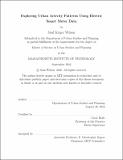Exploring urban activity patterns using electric smart meter data
Author(s)
Wilson, Saul Kriger
DownloadFull printable version (12.31Mb)
Other Contributors
Massachusetts Institute of Technology. Department of Urban Studies and Planning.
Advisor
Carlo Ratti.
Terms of use
Metadata
Show full item recordAbstract
This thesis uses electricity consumption data from household and enterprise-level smart meters in County B, Country A, and Turin, Italy, to explore temporal and geographic variations in urban energy consumption and thus urban activity. A central question is whether electricity consumption patterns vary between different economic sectors, across space, and between different days of the week and times of year. This data shows clearly that Country A activity patterns are roughly similar across all seven days of the week, whereas Italian electricity consumption declines markedly on weekends, particularly Sundays. In general, and particularly in Italy, this thesis shows strong seasonality to electricity consumption, with clearly identifiable seasons and high correlation in consumption patterns within each season. This thesis focuses on user type variation in Country A, where although certain patterns are more widespread in some sectors than others, there is significant overlap between pairs of sectors. Hence this thesis is able only to classify land use between residential and industrial sectors, and is unable to classify land use to a meaningful degree of accuracy by analyzing electricity consumption. It is, however, possible to detect geographic variation: urban and industrial centers consume a higher percentage of their electricity on weekdays and during regular work hours than rural areas. In addition, the impact of various special occurrences on urban behavior is probed. This thesis provides measurement of the impact of various holidays on economic activity, using electricity consumption as a proxy. Large (industrial) consumers are generally much more sensitive to holidays than small (residential) consumers are, except during the summer months in Italy. In general, consumption declines on a single holiday are highly correlated with consumption declines on other holidays. Furthermore, using observations at 15-minute intervals, I attempt to measure the short-term behavior shifts caused by daylight savings time's start and finish.
Description
Thesis: S.M., Massachusetts Institute of Technology, Department of Urban Studies and Planning, 2016. This electronic version was submitted by the student author. The certified thesis is available in the Institute Archives and Special Collections. Cataloged from student-submitted PDF version of thesis. Includes bibliographical references (pages 109-111).
Date issued
2016Department
Massachusetts Institute of Technology. Department of Urban Studies and PlanningPublisher
Massachusetts Institute of Technology
Keywords
Urban Studies and Planning.